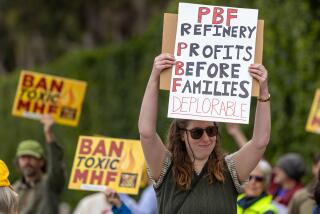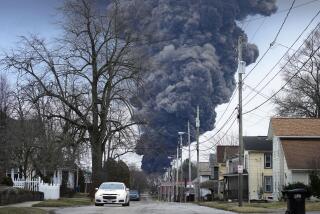Chemical Industry vs. Safety
âIt sounded like the city blew up,â a resident of the Texas Gulf Coast town of Freeport told a TV reporter after a blast there Friday rocked buildings and blew out windows nearly 50 miles away. The explosion was another in a series of reminders about two threats that Americans face in the age of terrorism: hazardous chemicals and a government that thinks information is hazardous to citizens.
In Freeport, sheriffâs deputies would say only that an explosion had occurred at a chemical company and people should stay indoors. Residents finally figured out that the explosion had occurred at a BASF nylon manufacturing plant. A recorded message there confirmed the blast but gave no details.
Plant officials took their time filling in the critical blanks. So, for hours, anxious residents had no clue they were being exposed to potentially toxic ammonia and cyclohexanone oxime, released when an overheated rail car blew up outside the plant.
People living near the nationâs chemical plants and the rail lines and highways connecting them need protections from dangerous chemicals, whether released by accident or murderous fanatics. But contrary to the Bush administrationâs paternalistic posturing and the chemical industryâs proprietary demands, keeping people in the dark about the risks around them only makes matters worse.
Senate Majority Leader Tom Daschle (D-S.D.) should address this two-part problem head-on by amending the homeland security bill (whose language will be finalized today) with a provision by Sen. Jon Corzine (D-N.J.). It would beef up security at plants containing hazardous chemicals while guaranteeing the public the right to such basic information as which chemicals are there.
Two months ago, a Senate committee passed the Corzine bill in a 19-0 vote. Then, with an audacity that is incredible in light of recent chemical mishaps, the industry began lobbying Senate leaders to kill the bill before todayâs vote.
The Corzine bill, as carefully amended, requires chemical plants to assess their vulnerability to accidents and terrorist attacks, compels them to take measures to reduce that vulnerability and requires them to make public a basic outline of their risk assessments (with sensible exemptions to protect trade secrets and thwart terrorists).
Chemical companies contend that disclosing any information would end up benefiting terrorists. And the Bush administration, with a penchant for secrecy that predates last yearâs terror attacks, seems to view as mere annoyances such critical tools of democracy as the Freedom of Information Act.
But Corzineâs bill strikes a common-sense balance between security imperatives and democratic freedoms: in this case, a plantâs interest in avoiding sabotage versus peopleâs right to information that would let them lobby for environmental safeguards or make important decisions--such as when itâs OK to let a child play outdoors.
More to Read
Sign up for Essential California
The most important California stories and recommendations in your inbox every morning.
You may occasionally receive promotional content from the Los Angeles Times.










